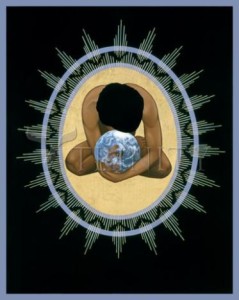Hurricane Harvey: Rising up as the waters rise
Like many Americans, I have been gripped by news of the disaster now unfolding along our nation’s Gulf Coast. As torrential rains bear down on Texas and Louisiana and the floods swell, people are struggling to survive and struggling to rescue family-members, neighbors, and pets. Stories of tragedy and terror, courage and loss have unfolded all week: trapped in his car, an elderly man is rescued from rising waters by a human chain; swept away in the flood, a mother, carrying her toddler on her back, is found dead, floating face down; the three-year-old girl, still clinging to her mother, is pulled to safety.

Stories like these pull us into prayer – grief for those who perished, anguish for those in harm’s way, gratitude for the people saving everyone they can, and a rising tide of anger and resolve: we will not stand idly by as people drown and are dislocated in extreme storms like these.
Part of a faithful response is concrete and immediate: if we live nearby and have a boat or clothes to spare, we can offer what we have. Wherever we live, if we have money to spare, we can donate to a disaster relief organization, including faith-rooted groups such as Episcopal Relief and Development and Church World Service.
Another part of a faithful response is to take a good, long look at what led to this catastrophe. Did climate change intensify the storm? The answer, say leading climate scientists, is yes. Oceans absorb some of the excess heat trapped in the air by burning fossil fuels. Unusually warm waters in the Gulf of Mexico fed the tropical storm, which took only about 48 hours to intensify from a tropical depression to a Category 4 hurricane. What might have been a run-of-the-mill hurricane turned into a monster storm. As Kevin Trenberth of the National Center for Atmospheric Research told The Atlantic, “It may have been a strong storm, and it may have caused a lot of problems anyway—but [human-caused climate change] amplifies the damage considerably.”
Climate scientist Michael E. Mann of Pennsylvania State University likewise confirmed the connections between climate change and Harvey’s destructive power. In his article entitled, “It’s a fact: climate change made Hurricane Harvey more deadly,” Mann pointed out that, while climate change did not “cause” Harvey, “Harvey was almost certainly more intense than it would have been in the absence of human-caused warming, which means stronger winds, more wind damage and a larger storm surge.”
This week, author and social activist Naomi Klein also pointed out that Harvey “didn’t come out the blue”: it was just the kind of extreme weather event that climate scientists have long been predicting. Surely now is the time, she argues, to have a serious policy debate in this country about the host of questions that Harvey raises: What kind of energy should we rely on (a question, she points out, “with jarring implications for the dominant industry in the region being hit hardest: oil and gas”)? What kind of safety net do we need to provide for the poor, the ill, and the elderly, given their vulnerability in times of disaster and given the certainty that storms like Harvey are only a harbinger of the climate-related storms that lie ahead?
Journalist Wen Stephenson is also attuned to the links between climate change and social justice. In an article with the bold headline, “Houston’s Human Catastrophe Started Long Before the Storm,” he writes: “Our unfolding climate catastrophe… is rooted in social and economic inequalities that render most vulnerable the most marginalized and powerless… Decades of neglect, inequality, and disenfranchisement – to say nothing of heedless development and a lack of flood planning tantamount to criminal negligence – mean that Houstonians of all backgrounds, but especially the poorest and most vulnerable communities, primarily communities of color, have been left utterly undefended.”
Climate change has never been only about polar bears. Stabilizing the climate is about social, racial, and economic justice, too – about treating Earth and each other with reverence and respect. How many more floods need to drown or displace our citizens and destroy our homes before we wake up to the climate crisis and take urgent steps to keep fossil fuels in the ground? How many more vulnerable communities are we willing to sacrifice in order to keep dumping greenhouse gases into the atmosphere and keep enriching fossil fuel industry billionaires?
Meanwhile, as Harvey brings devastation to our Gulf Coast, a record-breaking strong monsoon season in Southeast Asia has caused over 1200 deaths this summer. Thanks to Harvey, Americans are newly aware of the suffering caused by floods exacerbated by climate change. Perhaps now we can look with greater empathy at similar images coming from India, Nepal, and Bangladesh – images of other mothers wading through flooded areas, carrying their children in their arms; images of other homes destroyed and other communities cut off, with no food and clean water for days.

Perhaps now, after seeing what Harvey is doing to Houston, we can look ahead and grasp more clearly – more viscerally – what it means when scientists predict that sea level rise will flood hundreds of American cities in the near future. A new report published by The Union of Concerned Scientists shows that by the end of the century, chronic flooding – defined as flooding so unmanageable that it drives people to move away – “will be occurring from Maine to Texas and along parts of the West Coast. It will affect as many as 670 coastal communities, including Cambridge, Massachusetts; Oakland, California; Miami and St. Petersburg, Florida; and four of the five boroughs of New York City.”
Cambridge, Massachusetts? I was born and grew up there. By the end of the century? I do the arithmetic, figuring the ages of my children and grandchildren. I imagine the social chaos, the streams of refugees, the abandoned buildings.
Will we look back on Harvey (and Katrina and Sandy) as the first in a relentless wave of storms that eventually brought down many of America’s great cities? Or will we look back on Harvey as the storm that finally got the attention of the American public and showed us the urgent need to take action on climate?
Climate change is neither distant nor abstract. It is real, present, and personal. Our country’s President denies the existence and human causes of climate change, and his environmental policies surely make matters worse, but people of faith, and people of good will, refuse to abandon the Earth entrusted to our care.
Tomorrow, on September 1, Christians will mark a World Day of Prayer for the Care of Creation. Whatever your faith tradition, I invite you to join in this planet-wide pause to hold our troubled world in our hearts. I invite you to go outside and appreciate the living world around you – the trees, soil, water, birds, and clouds. I invite you to acknowledge your own grief, anger, and fear about the Earth’s unraveling web of life, and I invite you to seek the guidance, resolve, and courage that come from listening to our deepest inner wisdom, the place where Love dwells.

For millions of Christians worldwide, September 1 marks the first day of the Season of Creation, a season dedicated to lifting up the sacredness of the natural world. Creation Season generally ends on October 4, the Feast of St. Francis of Assisi, the man often called the patron saint of ecology. (For resources to mark this day of prayer and the whole Creation Season, visit Creation Justice Ministries.)
Here in Massachusetts, Episcopal congregations will mark their own Season of Creation, from October 4 through the end of November. In the Diocese of Western Massachusetts, we have assembled a mass of resources to help individuals and communities of faith to mark Creation Season. I hope that you will take a look, and decide how you and your community of faith will act, advocate, learn, and pray on behalf of God’s good Earth. How will you celebrate Creation Season this year? Will you design an outdoor worship service at a place of environmental degradation? Offer prayers to bless solar panels? Preach about the climate crisis? Carry out non-violent civil disobedience to protest a new gas pipeline? Organize a study group?
How will the extraordinary suffering and tragedy of Harvey – much of it endured beyond the reach of TV cameras and crew – strengthen your intention to become an agent of healing and hope?
An excerpt of this essay with published by Daily Hampshire Gazette on Sept. 5, 2017: “Columnist Margaret Bullitt-Jonas: Harvey reinforces urgency of climate-change crisis“

4 Responses to “Hurricane Harvey: Rising up as the waters rise”
Richard Pree
Dear Margaret,
You express with deep eloquence so much of what is on my heart.
Thank you, especially for suggesting ways I can act, starting with prayer.
Richard
mbj
Dear Richard, Thank you for your comments, and for being on this journey with me. I’m glad that my words were helpful. Finding a way to wrap our minds and hearts around this crisis is an ongoing challenge. I find that making room for prayer helps me stay at least somewhat grounded. And thanks for all your work to push for carbon pricing through Citizens Climate Lobby.
Linda Cutting
Thank you, Margaret, for putting this heartbreaking event in its even more heartbreaking context, and for calling on us as Christians to respond as stewards–of creation, of the poor and marginalized. I just read this aloud to my twelve-year-old daughter who asked me, “is Hurricane Harvey part of climate change?”
I knew exactly where to turn for my answer!
mbj
Dear Linda, I am touched that this piece of writing became part of your family’s conversation. Thank you for letting me know. Blessings to all of you!